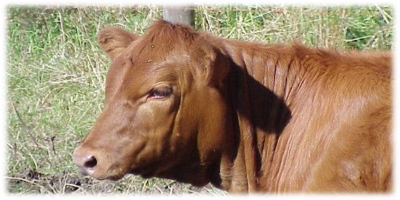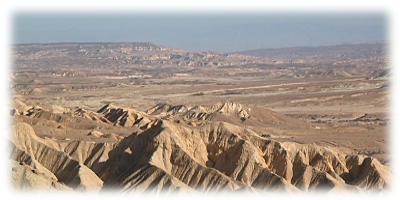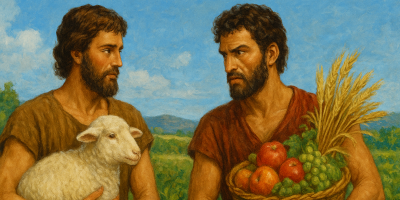He said, "If you listen carefully to the voice of the LORD your God and do what is right in his eyes, if you pay attention to his commands and keep all his decrees, I will not bring on you any of the diseases I brought on the Egyptians, for I am the LORD, who heals you." (Exodus 15:26)
Is God's promise, given in the passage above, what we would call a miracle? Or is there something more "scientific" at work behind the commands of God? Let's take the command to wash in the ashes of the Red Heifer (Numbers 19:1-12) as an example and look at the text with a more in-depth study of the words in the text.
1 Now the LORD said to Moses and to Aaron, 2 "This is the statute of the law which the LORD has commanded: Tell the people of Israel to bring you a red heifer without defect, in which there is no blemish, and upon which a yoke has never come.
Literally, the underlined portion of the verse reads, "a heifer of red, a whole one which has no blemish in her which has no yoke lifted over her". The Hebrew poetry of the end of this verse is very beautiful - lo alah aliyah al. This heifer never wore a yoke, which means that it will be fat. The Hebrew word "mum" translated as blemish or spot is often thought to mean completely perfect as in without even one white hair on it. The actual meaning of the word can be see in Deuteronomy 15:21; "And if there be any blemish (mum) therein, as if it be lame, or blind, or have any ill blemish, thou shall not sacrifice it unto the LORD thy God."
3 And you shall give her to Eleazar the priest, and she shall be taken outside the camp and slaughtered before him; 4 and Eleazar the priest shall take some of her blood with his finger, and sprinkle some of her blood toward the front of the tent of meeting seven times.
Portions of this procedure seem to be ritualistic in nature such as the sprinkling of the blood seven times in the direction of the tabernacle. The number seven is often associated with an oath, as an oath was spoken seven times, probably to emphasis its importance. The following procedure is part of the oath, or covenant between God and Israel.
Ritual is always a part of every day life, just as when we stand and salute the flag or pray before meals. These rituals are physical reminders to keep our focus on what is important. While this procedure is performed outside the camp, we are reminded that the focus is still the tabernacle.
5 And the heifer shall be burned in his sight; her skin, her flesh, and her blood, with her dung, shall be burned;
In this verse we have the burning of the skin, flesh, blood and dung of the animal. On a side note, the smoke from this and other sacrifices do repel insects which can carry diseases. A clear physical benefit to the sacrifices. There very well could be chemical ingredients in the smoke from a burning animal that may repel insects far better than just wood smoke.
6 and the priest shall take cedarwood and hyssop and scarlet stuff, and cast them into the midst of the burning of the heifer.
Added to the fire is cedar wood, hyssop and a "scarlet thing." The cedar oil came from a kind of juniper tree that grew in both Israel and the Sinai. The cedar oil irritates the skin, encouraging the person to vigorously rub the solution into his hands. Hyssop oil contains 50% carvacol, which is an antifungal and antibacterial agent that still used in medicines today. The scarlet thing, which in the Hebrew text is the word tola (Strong's #8438, is literally the kermes worm (coccus ilicis), an insect used for making a scarlet dye, but was also used in ancient times as an astringint skin lotion.
7 Then the priest shall wash his clothes and bathe his body in water, and afterwards he shall come into the camp; and the priest shall be unclean until evening. 8 He who burns the heifer shall wash his clothes in water and bathe his body in water, and shall be unclean until evening. 9 And a man who is clean shall gather up the ashes of the heifer, and deposit them outside the camp in a clean place; and they shall be kept for the congregation of the people of Israel for the water for impurity, for the removal of sin.
The above ingredients, cedar wood, ashes from the heifer, fat from the heifer, hyssop oil, and the kermes worm are combined in water creating an antifungal and antibacterial soap. This soap then is stored (rested in the Hebrew) in a clean place outside the camp as the "water of filthiness".
10 And he who gathers the ashes of the heifer shall wash his clothes, and be unclean until evening. And this shall be to the people of Israel, and to the stranger who sojourns among them, a perpetual statute. 11 "He who touches the dead body of any person shall be unclean seven days; 12 he shall cleanse himself with the water on the third day and on the seventh day, and so be clean; but if he does not cleanse himself on the third day and on the seventh day, he will not become clean.
One who has been in contact with a dead body (i.e.: potential carrier of diseases received from the dead body) is first removed from the camp (quaratined) and taken outside to the place of the "water of filthiness" and then is washed with the above solution, whose ingredients would be very useful in eliminating any diseases that one can come in contact with from a dead body.
God promises that if we follow his teachings (torah), we will be free from diseases. The above commands of the Torah will do just this, the ancient Hebrews may not have understood the scientific benefit to the "water of filthiness" as we can see today, but through their faith they were made "clean".

Like what you’re discovering? Continue the journey from Bible reader to translator.
|






